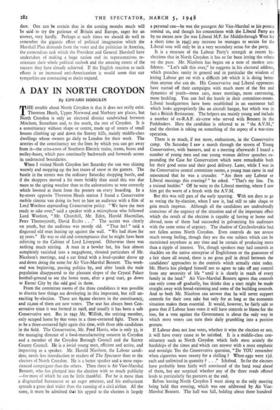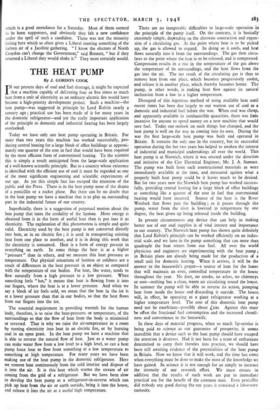A DAY IN NORTH CROYDON
By EDWARD HODGKIN
THE trouble about North Croydon is that it does not really exist. Thornton Heath, Upper Norwood and Norbury are places, but North Croydon is only an electoral district sandwiched between Mitcham, Streatham and, to the south, the rest of Croydon. It is a constituency without shape or centre, made up of streets of small houses climbing up and down the Surrey hills, mainly middle-class dwellings whose owners go daily to London for their work. The arteries of the constituency are the lines by which you can get away from it—the criss-cross of Southern Electric trains, trams, buses and trolley-buses, which pass continually backwards and forwards across Its undetected boundaries.
When I visited North Croydon last Saturday the sun was shining warmly and mopping up the last traces of snow in the gutters. The bustle in the streets was the ordinary Saturday shopping bustle, and if the shoppers moved a bit more briskly than usual this was due more to the spring weather than to the exhortations to vote correctly which loomed at them from the posters on every hoarding. In a by-street opposite Thornton Heath station I found a Conservative mobile cinema van doing its best to lure an audience with a film of Lord Wootton expounding Conservative policy. " We have the men ready to take over," said a speaker with a microphone who followed Lord Woolton, " Mr. Churchill, Mr. Eden, Harold Macmillan, Peter Thorneycroft, David Eccles . . ." The accent was clearly on youth, but the audience was mostly old. " That lot! " said a disgusted old man leaning up against the wall. " We had them for 25 years." He was so old and contemptuous that he might have been referring to the Cabinet of Lord Liverpool. Otherwise there was nothing much stirring. A man in a bowler hat, his face almost completely vanished into a megaphone, shouted particulars of Mr. Nicolson's meetings, and a car fitted with a loud-speaker drove up and down doing the same for Air Vice-Marshal Bennett. The week- end was beginning, passing politics by, and after lunch the male population disappeared to the pleasant slopes of the Crystal Palace football-ground to see the home team, after a good start, go down to Exeter City by the odd goal in three.
From the committee rooms of the three candidates it was possible to discern how things are developing in this important, but still un- exciting by-election. There are 89,000 electors in the constituency, and 12,000 of them are new voters. The seat has always been Con- servative since it was formed in 1918, and usually it has been a safe Conservative seat. But in 1945 Mr. Willink, the retiring member, only scraped home by boo votes in a three-cornered fight. There is to be a three-cornered fight again this time, with three able candidates in the field. The Conservative, Mr. Fred Harris, who is only 33, is the managing director of a food-manufacturing concern in Croydon and a member of the Croydon Borough Council and the Surrey County Council. He is a jovial young man, efficient and active, and improving as a speaker. Mr. Harold Nicolson, the Labour candi- date, needs less introduction to readers of The Spectator than to the
electors of North Croydon. He is a better speaker and a more expe- rienced campaigner than the others. Then there is Air Vice-Marshal Bennett, who has plunged into the election with so much publicity —for most of which he can be little thankful. For he is more than a disgruntled bureaucrat or an eager amateur, and his enthusiasm spreads a great deal wider than the running of a civil airline. All the same, it must be admitted that his appeal to the electors is largely
a personal one—he was the youngest Air Vice-Marshal as his posters remind us, and though his connections with the Liberal Party are by no means new (he was Liberal M.P. for Middlesbrough West for a short time in 1945).any increase he manages to secure for the Liberal vote will only be in a very secondary sense for the party.
It is a measure of the Labour Party's strength at recent by- elections that in North Croydon it has so far been letting the others set the pace. Mr. Nicolson has begun on a note of modest con- fidence. " Let's talk this over," he suggests in his electoral address, which preaches sanity in general and in particular the wisdom of letting Labour get on with a difficult job which it is doing better than anyone else can do. His Conservative and Liberal opponents have started off their campaigns with much more of the fire and dynamics of youth—more cars, more meetings, more canvassing, more heckling. You can feel the hustle in their committee-rooms. Liberal headquarters have been established in an enormous hall which looks appropriately like an aircraft hangar, but which was in fact a British Restaurant. The helpers are mainly young and include a number of ex-R.A.F. air-crew who served with Bennett in the Pathfinders. Here the candidate is referred to as " the A.V.M.," and the election is taking on something of the aspect of a war-time operation.
There is as much, if not more, enthusiasm, in the Conservative camp. On Saturday I saw a march through the streets of Young Conservatives, with banners, and at a meeting afterwards I heard a number of young men and one young woman deliver speeches ex- pounding the Case for Conservatism which were remarkable both for their good sense and their good delivery. Later, while I was in the Conservative central committee rooms, a young man came in and announced that he was a crusader. " Are there any Labour or Liberal meetings this evening? " he asked. " That's my line. I'm a trained heckler." Off he went to the Liberal meeting, where I saw him get the worst of a brush with the A.V.M.
But this was still part of the early sparring. With ten days to go to voting the by-election, when I saw it, had still to take shape or gain much impetus. Although all the candidates are undoubtedly conscious of the urgency of the situation and of the important effect which the result of the election is capable of having at home and abroad, none of them had succeeded in galvanising his audiences with the same sense of urgency. The shadow of Czechoslovakia had not fallen across North Croydon. Even controls do not arouse much strong feeling, though they are the one subject which can be mentioned anywhere at any time and be certain of producing more than a ripple of interest. Yet, though speakers may hail controls as shackles on the native enterprise of Englishmen or the guarantee of a fair share all round, there is no great gulf in detail between the candidates' approaches to the controls which actually exist today. Mr. Harris has pledged himself not to agree to take off any control from any necessity of life " until it is clearly in reach of every family in the land." Air Vice-Marshal Bennett agrees that controls can only come off gradually, but thinks that a start might be made straight away with bread-rationing and some of the building controls. And to both Mr. Nicolson can answer that he will never support controls for their own sake but only for as long as the economic situation makes them essential. It would, however, be fairly safe to guess that if Labour loses votes it will have controls to blame for the loss, for a vote against the Government is about the only way in which most voters can turn their daily grumbling into a positive gesture.
If Labour does not lose votes, whether it wins the election or not, it will have every cause to be satisfied. It is a middle-class con- stituency such as North Croydon which feels most acutely the hardships of the times and which can _answer with a most emphatic and nostalgic Yes the Conservative question, " Do YOU remember when cigarettes were twenty for a shilling ? When eggs were each and unlimited in quantity ? . . ." Ichabod. So far the electors have probably been fairly well convinced of the hard road ahead of them, but are sceptical whether any of the three roads offered leads to particularly fat pastures at the end.
Before leaving North Croydon I went along to the only meeting being held that evening, which was one addressed by Air Vice- Marshal Bennett. The hall was full, holding about three hundred which is a good attendance for a Saturday. Most of them seemed to be keen supporters, and obviously they felt a new confidence under the spell of such a candidate. There was not the minority feeling here which so often gives a Liberal meeting something of the forlorn air of a Jacobite gathering. " I know the electors of North Croydon can't change the Government," said Bennett, " but if they returned a Liberal they would shake it." They most certainly would.































 Previous page
Previous page